Resources
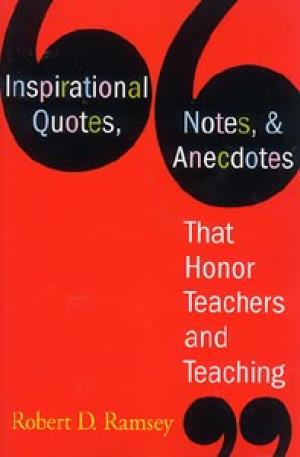
The complete uplifting guide for every teacher to enrich each day and a career in teaching! All teachers need encouragement, affirmation, support, and to be reminded that they are part of a noble profession. Best-selling author Robert D. Ramsey has been an avid collector of inspirational quotes, notes, anecdotes, reflections, testimonials, and tributes for educators, and his new collection provides potentially career-saving homework for the soul of every teacher. This easy-to-read, but hard-to-forget anthology is full of powerful reminders that there is no such thing as "only a teacher." The contents of this uplifting resource have been carefully harvested by an educator for educators and are designed to: * Help belabored and beleaguered educators jump start their careers * Reclaim their professional pride * Rekindle their passion for teaching * Get the grit to press on against all odds Inspirational Quotes, Notes, & Anecdotes That Honor Teachers and Teaching makes a strong unified statement all teachers need to hear! (From the Publisher)
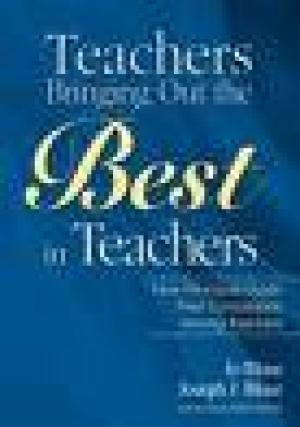
From the Publisher Most teachers have experienced some kind of formal mentoring or induction program. What these programs can miss is the meaningful daily interaction with peers that builds mutual trust and instructional collaboration-the organic, coachable moments that boost professional learning. Based on a unique investigative study of nearly 300 teachers, this powerful new resource provides informative teacher perspectives of informal, naturally occurring, teacher-to-teacher professional development. Jo and Joseph Blase use this research to identify the following five teacher behaviors that can positively influence other teachers’ morale, teaching skills, and professional growth: * Building healthy relationships by communicating, caring, and developing trust * Using five guiding principles for structuring learning experiences * Planning and organizing for learning * Showing and sharing * Guiding for classroom management This excellent resource helps school leaders promote a culture that encourages lasting professional development. Each chapter presents practical concepts and strategies that can occur in and out of the classroom. Educators share specific experiences and examples, showing each skill in action. School leaders will learn what strong teacher peer "consultants" actually do that leads to improved teacher confidence and motivation, enhanced trust and mutual respect, and reflective instructional behavior among their colleagues. These cost-effective, authentic strategies will build camaraderie and leadership in your school, engaging colleagues as a team in the vital mission of all schools-educating our youth.
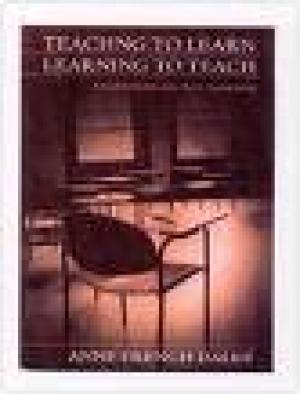
Dalke brings together a collection of accounts written by herself, students and colleagues. These are incorporated into seven chapters corresponding to the seven stages of Dalke's reflection about teaching and learning in the liberal arts classroom. The text explores the evolution of Dalke's approach to teaching; Dalke's decision to redesign her classes using the model of the Quaker Meeting for Business; difficulties she faced when trying to apply such a model, including the complexities which silence and desire contribute to the classroom; and Dalke's attempt to describe "a vision of the paradise that my classroom might be as well as the unending labor and prayer needed to maintain such a space." (From the Publisher)
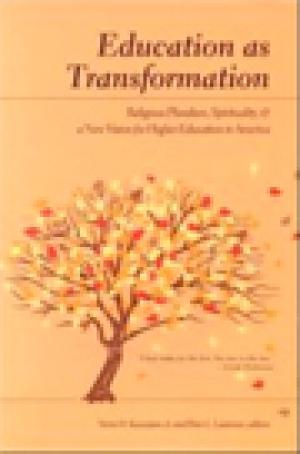
Reflecting a national movement that seeks to create a more holistic model of learning and teaching on college and university campuses, Education as Transformation is a collection of twenty-eight essays written by a wide range of educators - including presidents, chancellors, deans, faculty members, administrators, religious life professionals, students, and other leaders in the field of education - on the themes of religious pluralism and spirituality in higher education. These essays provide scholarly analysis, practical information, and inspiration for those who agree that higher education can combine both head and heart in the teaching and learning process and in campus and community life. In seeking to articulate a new vision for higher education in America, the authors explore the possibility that both scholarship and spirituality are essential to fostering global learning communities and responsible global citizens who can address the challenges of a diverse world. (From the Publisher)
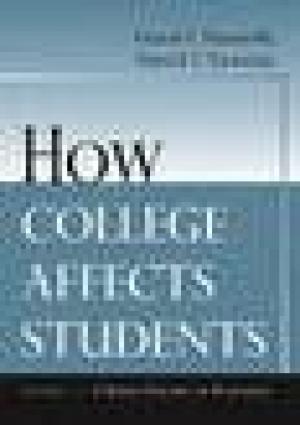
How College Affects Students, Volume 2 is the long awaited sequel to the landmark work that was first published in 1991. Offers the most comprehensive resource available on what is known about the effect of college on students. In this book, Pascarella and Terenzini provide current information and empirical research from the decade since their first book was published which distills what is know about how students change and benefit as a consequence of attending college. (From the Publisher)
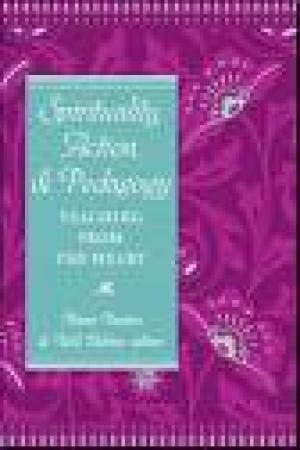
Spirituality, Action, & Pedagogy: Teaching from the Heart invites the reader to participate in a personal exploration of what it means to consciously seek the heart of education. The authors in this collection - practitioners in higher education and teaching in such diverse areas as educational foundations, communication, theater, sociology, reading and literacy, and performance studies - respond to this challenge by striking the most personal chords of their lived experience. As they relate their tales of spirituality and teaching, the reader will be coaxed into confronting the question of what it means to teach. Spirituality, Action, & Pedagogy addresses the integration of spirituality into pedagogical practice by providing cutting-edge examples of applications in classroom settings. (From the Publisher)
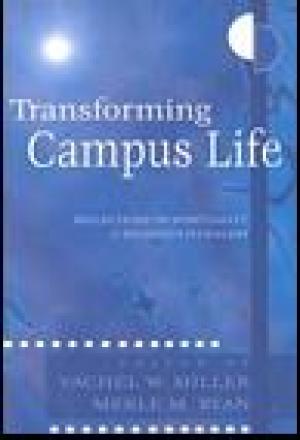
How can campus life become more hospitable to the human spirit? This book invites everyone concerned with the quality and meaning of campus life to engage in new conversations about the spiritual and religious dimensions of diversity, leadership, student development, and learning. This book challenges conventions in higher education that neglect religious identity and spiritual exploration while perpetuating disconnection, competition, and separation from our natural and social environments. It offers innovative approaches for positive change, while addressing the complex legal, organizational, and cultural issues involved in this conversation. Grounded in original research and professional practice, this collection includes reflections from college presidents, campus leaders, student affairs staff members, and faculty. (From the Publisher)

This book presents a series of reflections - excerpts from the inner and outer lives of college teachers - from which emerges a common concern for the interactive and spiritual dimensions of the educational process, and a sense of the light which can and should illuminate it. Informed either by personal commitment to Quakerism, or by individual work within Quaker institutions, the contributors offer perspectives that are important for teachers, parents, and readers generally interested in the classroom experience as a process of growth and exploration. (From the Publisher)
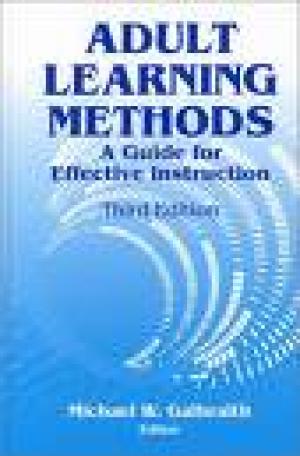
Twenty-seven American academics and educational consultants contribute 22 chapters providing practitioners with an overview of adult learning, and practical information regarding methods and techniques for use in a range of educational settings. The third edition is oriented toward a more formal instructional environment than were previous editions. Some chapters from the second (1998) edition have been deleted, the remaining have been revised, and six new chapters added on designing instruction, understanding and using learning styles, motivation, interactive television, course portfolio, and creating learning communities. (From the Publisher)
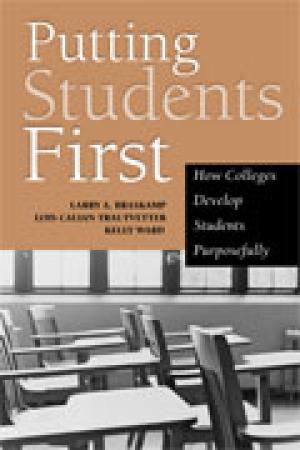
Society is calling for higher education to take more responsibility for helping students find purpose and meaning in life. In this book, the authors argue that colleges should purposefully invest in students in ways that will foster their holistic development by recognizing and building on students' purpose in life, intellectually, spiritually, and morally. By using the "4C framework"— culture, curriculum, cocurriculum, and community— faculty, student affairs staff, and academic administrators will be able to discuss, plan, and create a college environment that effectively supports the learning and development of students. The book contains a set of themes and calls for consideration and action based on the findings of site visits at 10 colleges and a set of questions to help readers think about and plan how to develop students holistically on their own campuses. (From the Publisher)